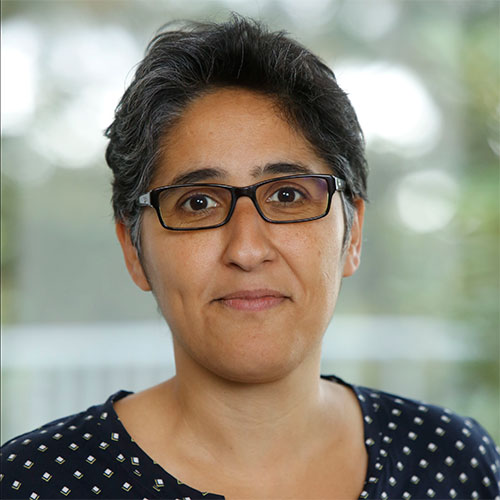
Harnessing innate immunity to enable cancer control
Hind Medyouf
Georg-Speyer-Haus Institute for Tumor Biology and Experimental Therapy
26/04/2023
12:00-14:00
Sala de Graus Roser Valls (Aulari) UB
Abstract
Over the last few decades, our understanding of cancer has evolved from a tumor cell centric perspective towards a more comprehensive “tissue-like” picture. In this complex ecosystem, tumor cells co-opt their surrounding tumor microenvironment (TME) to shape a local milieu that ultimately favors the acquisition of so-called “cancer hallmarks”. The ability to evade immune control is a key cancer hallmark, commonly associated with the ability of tumor cells to escape recognition and killing by T cells. Consequently, most immunotherapeutic modalities currently under clinical evaluation, focus on boosting exhausted and dysfunctional tumor-specific T cells by targeting defined checkpoints, such as the PD1/PDL1 axis. However, lack of therapeutic efficacy in a significant proportion of patients and cancer types, remains a major hurdle for broad clinical exploitation.
Our team is interested in mapping and leveraging niche contributions that impose an immune-suppressive TME conducive to tumor-immune escape. We do so in hematological malignancies and brain metastasis, a common site of metastatic dissemination from solid cancers. Specifically, we focus on innate immune cells, namely tumor-associated myeloid cells, that are firmly established as key drivers of local immune suppression. Our studies uncovered the existence of innate immune checkpoints, that drive the acquisition of immune suppressive features which hamper the early steps of the “cancer immunity cycle” and limit engagement of downstream effector cells, including T cells. Blocking these innate immune checkpoints reverts immune suppression and kick starts the “cancer immunity cycle” thereby enabling effective cancer control. Notably, innate immune checkpoint blockade also synergizes with standard of care therapy and confers de novo sensitivity to adaptive immune checkpoints, thereby enabling long-lasting responses. Overall, our work demonstrates that leveraging innate immunity could bring forth significant benefit to cancer patients.
Hosted by Elisa Espinet, Cell Identity and Tumor-Stroma Crosstalks in Pancreatic Cancer and by Carolina Florian, Stem Cell Aging Group
Short Bio
Hind Medyouf is an EMBO young investigator based at the Institute for Tumor Biology and Experimental Therapy (Georg-Speyer-Haus), Frankfurt, Germany. Hind trained as a PhD at the Curie Institute (France; 2003-2007) followed by two postdocs as an EMBO and HFSP fellow in Canada (Terry Fox Lab; 2008-2010 with Prof. Andrew Weng) and Germany (DKFZ; 2010-2014 with Prof. Andreas Trumpp), respectively. As a trainee, she built a strong expertise and track record in the pathophysiological mechanisms driving hematological malignancies and their exploitation for therapeutic purposes (Nature Medicine 2007; Blood,2010; JEM 2011; Cell Stem Cell 2014). End of 2014, Hind obtained an ERC starting grant and established her research group in Frankfurt, where she is pursuing research questions centered around the importance of the tumor microenvironment in hematological malignancies and metastasis (Blood 2016; Leukemia 2018; Cancer Discovery 2021). Her current work focuses on (1) the mechanisms underlying of tumor-driven niche co-option and immune evasion as well as (2) the contribution of age-related niche changes to cancer progression.
